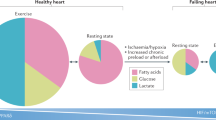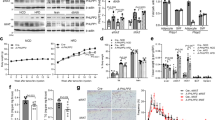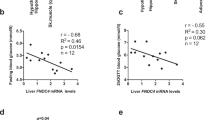Abstract
Peroxisome proliferator-activated receptors (PPARs) are nuclear receptor isoforms with key roles in the regulation of lipid and glucose metabolism. Synthetic ligands for PPARγ (and PPARα) have effects of promoting insulin sensitization in the context of obesity. Recent evidence suggests that activation of PPARδ might produce similar effects. Both PPARγ and PPARα have also been shown to produce selected anti-inflammatory effects and to reduce the progression of atherosclerosis in animals (α and γ) or in humans (α). Mechanisms underlying insulin-sensitizing effects are complex. For PPARγ, direct effects on adipose tissue lipid metabolism with secondary benefits in liver and/or muscle (lipid levels and insulin signaling) have been implicated. For PPARα, accelerated lipid catabolism may contribute to reduced muscle or liver ‘steatosis’. Anti-inflammatory mechanisms as contributors to the beneficial metabolic effects of PPAR activation are also worth considering for the following reasons: (1) obesity and insulin resistance are associated with a proinflammatory milieu. (2) PPARγ has clear effects to oppose the effects of tumor necrosis factor-alpha (TNFα) in adipocytes. (3) effects of PPAR ligands on cytokine-mediated signaling (eg via NF-κB) may be expected to enhance insulin action. (4) Adipose production of several molecules that are implicated as markers or mediators of inflammation is reduced. (5) In humans, treatment with either PPARα or PPARγ agonists has been shown to reduce circulating levels of proteins that serve as markers of inflammation. (6) Adiponectin, a fat-derived circulating factor that has been implicated as having anti-inflammatory activity, is induced by PPARγ agonism.
This is a preview of subscription content, access via your institution
Access options
Subscribe to this journal
Receive 12 print issues and online access
$259.00 per year
only $21.58 per issue
Buy this article
- Purchase on Springer Link
- Instant access to full article PDF
Prices may be subject to local taxes which are calculated during checkout
Similar content being viewed by others
Author information
Authors and Affiliations
Corresponding author
Rights and permissions
About this article
Cite this article
Moller, D., Berger, J. Role of PPARs in the regulation of obesity-related insulin sensitivity and inflammation. Int J Obes 27 (Suppl 3), S17–S21 (2003). https://doi.org/10.1038/sj.ijo.0802494
Published:
Issue Date:
DOI: https://doi.org/10.1038/sj.ijo.0802494
Keywords
This article is cited by
-
Potent hepatoprotective activity of common rattan (Calamus rotang L.) leaf extract and its molecular mechanism
BMC Complementary Medicine and Therapies (2023)
-
Efficient D-allulose synthesis under acidic conditions by auto-inducing expression of the tandem D-allulose 3-epimerase genes in Bacillus subtilis
Microbial Cell Factories (2022)
-
Sweetness profiles of glycosylated rebaudioside A and its binary mixtures with allulose and maltitol
Food Science and Biotechnology (2021)
-
Optimization and validation for quantification for allulose of jelly candies using response surface methodology
Journal of Food Science and Technology (2021)
-
Potential effect of tropical fruits Phyllanthus emblica L. for the prevention and management of type 2 diabetic complications: a systematic review of recent advances
European Journal of Nutrition (2021)



